
JCCP Activities for Fiscal 2021
Fiscal 2021 was a commemorative year for JCCP, marking its 40th anniversary. Due to the impact of COVID-19 that has spanned three calendar years to date, however, all human resource development programs were held online from the beginning of the fiscal year as in the previous year. Accordingly, classrooms were refurbished and outfitted with the necessary equipment and materials to accommodate the online format, and creative efforts were made to provide curriculum and presentations suited to online learning, among various other measures.
The year 2021 also marked the 60th anniversary of diplomatic relations between Kuwait and Japan, and JCCP organized a commemorative online symposium with the goal of further deepening the friendly ties between the two countries. In the area of technical cooperation projects with other oil-producing countries, as well, JCCP has made every effort to respond to the
needs of counterpart countries amid restrictions imposed on foreign travel, and has consequently increased Japan’s presence in those countries.
The JCCP International Symposium was held for the 40th time this year in a hybrid format combining actual participation and live streaming. Beginning with a video presentation that reflected back on JCCP’s 40-year history, a large group of invited panelists befitting the milestone symposium engaged in an active and fruitful exchange of views on various topics of interest.
The Friendship Committee for Women Career Development (FCW) discussed solutions to issues in women’s careers based on an awareness survey of working women that was carried out for the first time in both Japan and UAE.
Details of each program are provided below.
Human Resource Development Programs
1. FY2021 summary
Continuing from fiscal 2020, all human resource development programs that are normally conducted directly by JCCP were held online in fiscal 2021, as the ongoing impact of COVID-19 has made the conventional in-person format difficult as it involves overseas travel. The 22 regular courses implemented directly by JCCP included four courses on strategic management and business planning, two on human resources, three on digital transformation, instrumentation and control, three on refinery facilities and LNG application technologies, two on petroleum distribution, two on environment and safety management, four on maintenance, and two on project management.
The above lineup of courses included two that were newly added to identify needs in major oil-producing countries. These courses, respectively on project management for promotion of digital transformation in refineries and for system integration, received good reviews from those attending.
In this second year of online courses, creative efforts were made to hold them in a manner that would enhance their efficiency. For example, to promote interactive exchanges between lecturers and participants and among the participants themselves, which online courses tend to lack, participatory programs were introduced that incorporated games and workshops. Such initiatives have strengthened participants’ satisfaction in the courses. Teaching materials that make use of 3D VR (virtual reality experience) were also introduced to provide the element of onsite tours that normally garner high demand from the participants.
In addition to regular courses, customized courses were implemented in response to individual requests from oil-producing countries in the Middle East and Southeast Asia. In fiscal 2021, ten customized courses (including a course for female managers) were held for Saudi Arabia, UAE, Vietnam, Myanmar, the Philippines, and Indonesia, among a number of other countries.
As a whole, the online courses were attended by a total of 547 participants, with 476 participants in courses conducted directly by JCCP and 71 in corporate courses conducted in cooperation with member companies. The breakdown of the number of participants to courses conducted directly by JCCP is as shown under “2. Completed Activities” below.
For the record, the cumulative total number of participants JCCP has received since its founding in 1981 had reached 26,452 by the end of fiscal 2021.
The researcher exchange (invitation/dispatch) program is offered with the aim of developing researchers for the development of advanced technologies in the oil downstream sector in the future, by mutually sending and receiving researchers between oil/gas-producing countries and Japan.
In fiscal 2021, one researcher each from the Petroleum Research & Development Center (PRDC) of the Iraqi Ministry of Oil and Kuwait Institute for Scientific Research (KISR) was received by a university research department and a research institute in Japan,
through the researcher invitation program implemented on commission by The Japan Petroleum Institute (JPI).
As the researchers were unable to personally come to Japan due to COVID-19, the program was held online. For the Iraqi researcher, monthly online guidance was provided from November to February. For the Kuwaiti researcher, an introduction to advanced technologies was given on a single occasion, as the priority of the initial research theme was changed by the Kuwaiti side after the theme had already been matched with a research institution in Japan.
Meanwhile, the researcher dispatch program could not be implemented in fiscal 2021, as there were no requests for the dispatch of Japanese researchers from overseas research institutes due to COVID-19. In its stead, however, an online workshop for young researchers was held as a new initiative with the participation of two researchers from PRDC and four Japanese graduate school students. The participants deepened mutual exchanges by making presentations on their respective research themes and engaging in questions and answers.
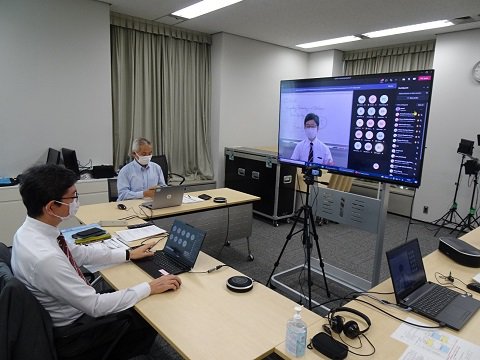 HRD Online program
HRD Online program
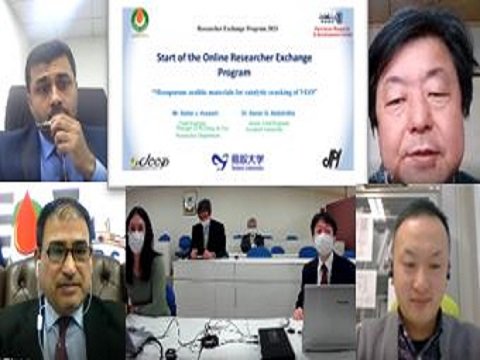
Researchers Exchange Program
Technical Cooperation Projects
1. FY2021 summary
JCCP assists oil/gas-producing countries in solving technical issues mainly in their oil downstream sector through the transfer of Japan’s technologies and expertise and the joint development and study of technologies in the form of technical cooperation projects. These projects are classified into three stages and implemented while carefully verifying their suitability at each stage.
In fiscal 2021, two first-stage project finding surveys (basic survey) were implemented in two countries; 12 second-stage feasibility studies (project formation study) were implemented in seven countries; and 19 third-stage joint projects with oil-producing countries were implemented in nine countries. It also bears special mention that two project implementation agreements were signed in fiscal 2021. A signing ceremony held online due to COVID-19 officially kicked off the “Technical cooperation to improve refinery competitiveness in Vietnam Phase 2” and “Enhancement of Operation Management at Petroleum Product Terminals Phase 3.”
While many overseas visits and researcher invitations had been planned, most were suspended, again due to COVID-19. Nevertheless, for three programs, onsite inspection and surveys of current situations were -successfully carried out by actually traveling abroad under full safety precautions against the pandemic. The results of the surveys were shared with the counterparts in real face-to-face discussions on how to implement the programs in the future. Otherwise, however, various measures were taken to engage in the usual activities by remote means where in-person discussions and meetings were difficult, by building on efforts experienced in fiscal 2020. For example, communication was maintained by employing a web conference system, operational improvement measures were proposed based on local operation data that was digitally received, imported local samples were examined by testing and analyzing them in Japan or by examining alternatives, videos of operational instructions were created, and technologies were introduced online.
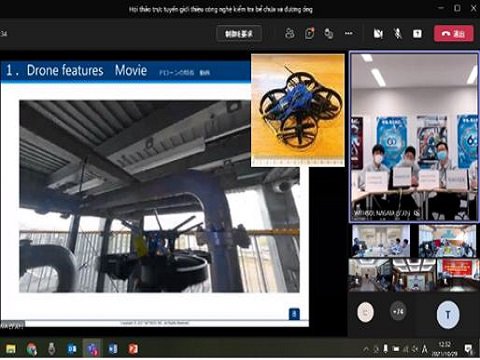
Status of inspection by micro drone (10s of centimeters)
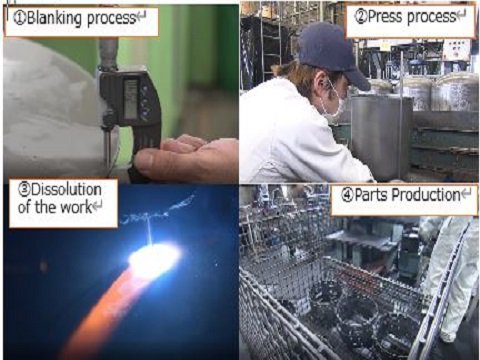
International Cooperation Programs
1. FY2021 summary
International cooperation programs aim to promote and strengthen information sharing, technical transfers and personal relationships through international conferences, networking meetings and other such activities.
[JCCP International Symposium]
The JCCP International Symposium has been held annually since JCCP’s founding, inviting leaders from oil- and gas-producing countries and energy experts to give presentations along with executives of oil companies in Japan. Such countries are generally represented by minister- and vice minister-class executives of government agencies and management executives of national oil companies. Through the exchange of views and sharing of information among leaders, the symposium casts light on issues that need to be addressed cooperatively toward Japan’s goal of securing stable supplies of oil and natural gas. It also provides a forum for personal exchanges toward maintaining and strengthening Japan’s relations with oil- and gas-producing countries.
In fiscal 2021, the 40th JCCP International Symposium was held in a hybrid format (on line / in-person) on January 27, 2022, with the attendance of more than 600 participants from within Japan and overseas. In this particular symposium, the opening ceremony included a video on JCCP’s history in commemoration of the 40th anniversary of the organization. Additionally, by increasing the usual number of panelists to 19 from 11 countries, even deeper exchanges of views were held in each panel.
In Leaders Panel 1, the theme of “Oil and Gas Industry Looks to a Sustainable Future – New Challenges and International Cooperation” was discussed by government officials, representatives from oil companies in Japan and overseas, and energy experts, from both policy and business perspectives. In Leaders Panel 2, themed “Management and HR as Strategic Drivers for SDG Goals,” the panelists introduced measures they are respectively taking toward the common goal of achieving the SDGs, with particular focus on human resource development and business management. In Leaders Panel 3, the panelists discussed the theme of “Energy Transition: Technology-driven Future Vision” by
introducing energy transition issues and specific technology development initiatives in their country. Through the sharing of the latest information and situations in each participating country, the panels cast light on common issues and deepened mutual understanding of each country’s policies and strategies.
[UAE-Japan Joint Study]
As part of the FCW* activities between ADNOC and JCCP, a joint study was conducted in UAE and Japan on “the awareness and status of working women” in the oil and gas industries and on “the impacts of the COVID-19 pandemic on home life and work life.” In Japan, a large number of questionnaire responses was received with the cooperation of seven companies to which members of the FCW planning and executive committee belong. The analyzed results of the study are planned to be announced next fiscal year after an academic discussion is held by a study team composed of university professors from both countries.
Additionally, an awareness survey was conducted on science students regarding their interest in the oil and gas industries and in the promotion of women’s advancement, to contribute to the employment and development of human resources in the oil and gas industries.
*Friendship Committee for Women Career Development.
[FCW Forum]
The Friendship Committee for Women Career Development (FCW) was established in 2015 to promote women’s career development in UAE and Japan. One of the activities of the Committee is the FCW Forum that is held annually to exchange information and raise awareness for the empowerment of women.
In fiscal 2021, the 13th FCW Forum was held online as it was last year. An Inspiring Talk was given by Ms. Yuka Shimada, HR & GA Director, Unilever Japan Holdings G.K. At a time when the oil and gas industries are poised to undergo a period of business transition, Ms. Shimada addressed the worries and concerns of women working in the industries by suggesting how they should think and act with regards to the future.
Following the Inspiring Talk, 10 participants from UAE, Saudi Arabia and Oman who attended a leadership program* for female managers working in Middle East oil-related companies, and eight female employees from oil-related companies and engineering companies in Japan, gave presentations on the future of work in the oil industry. They presented what they discussed in their workshops and what they propose, from the perspectives of “organizational revitalization” and “personal growth.”
A panel session was then held by experts on personnel affairs and diversity, who exchanged views on the main theme of the session, “Looking to the Future of the Oil and Gas Industry – D & I Management, Our Career Plan.”
*Management and Leadership for Women in Petroleum Industry (CPJ-5-21)
[Saudi-Japan Symposium (research / technology)]
The 30th Saudi-Japan Symposium (research / technology) was held online on December 13 and 14, 2021, under the theme of “Technology in Petroleum Refining & Petrochemicals – Innovation towards Circular Carbon Economy” (co-hosted by Saudi Aramco,
King Fahd University of Petroleum & Minerals (KFUPM), The Japan Petroleum Institute (JPI), and JCCP).
It featured two keynote presentations, 18 general presentations (including seven from Japan), and 10 poster sessions by young researchers (including two from Japan), and attracted an audience of more than 150 people.
[Kuwait-Japan Symposium (research / technology)]
The 20th Kuwait-Japan Symposium (research / technology) was held online on February 7 and 8, 2022 under the theme of “Advancement in Petroleum Refining Industries” (co-hosted by Kuwait National Petroleum Company (KNPC), Kuwait Institute for Scientific Research (KISR), The Japan Petroleum Institute (JPI), and JCCP). It featured two keynote presentations, 20 general presentations (including six from Japan), and eight poster sessions by young researchers (including one from Japan), and was attended by more than 100 people. Additionally, a celebratory video message and a slide show on the joint symposium were shown in commemoration of the 20th anniversary of the symposium.
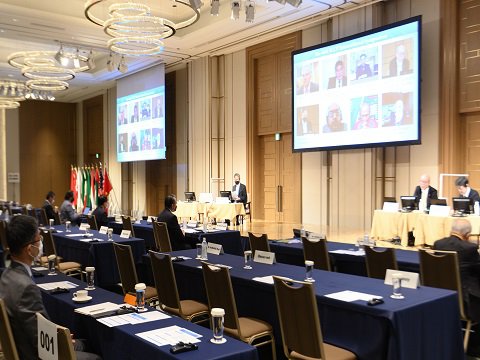
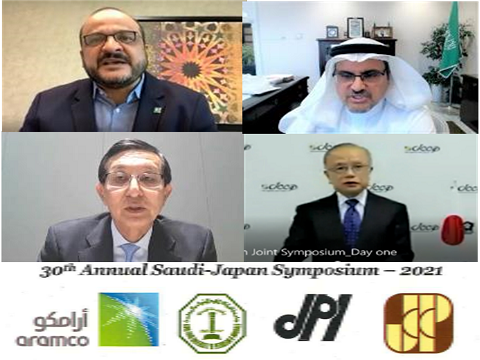 Saudi-Japan Symposium
Saudi-Japan Symposium
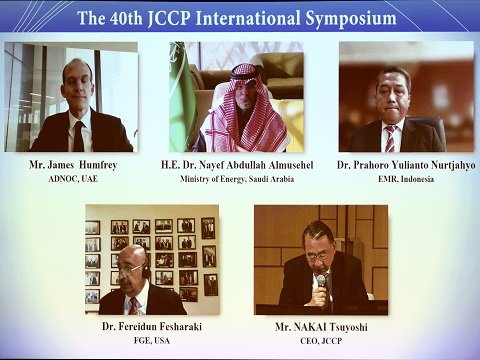
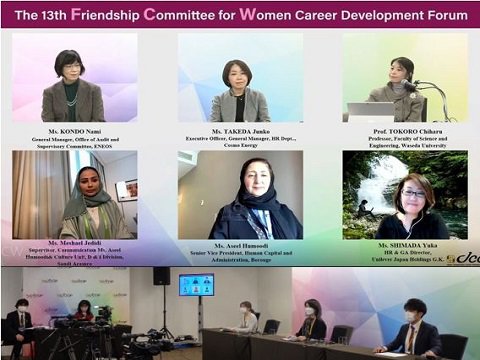
2. Completed Activities
Overseas Offices
JCCP has overseas offices in Al-Khobar, Saudi Arabia (Al-Khobar Office) and Abu Dhabi, UAE (Middle East Office). Each office is in charge of a group of Middle East countries. The Al-Khobar office is in charge of affairs in Saudi Arabia, Kuwait, Iraq and Bahrain, and the Middle East office is in charge of affairs in UAE, Qatar, Oman and Iran.
The principal roles of these overseas offices are to provide local support and to collect local information so that JCCP projects can be implemented in a smooth and safe manner in the countries under their charge. They also support Japanese companies that do business in the oil downstream sector in Middle East oil-producing countries by leveraging the network that JCCP
has established with national oil companies and other such organizations in those countries since its founding through the implementation of human resource development programs, technical cooperation projects and international cooperation activities.
In fiscal 2021, state-run oil companies in Middle East oil-producing countries have gradually resumed in-person meetings with outside business partners after a prolonged period of suspension due to COVID-19. Thus, in addition to providing online business support, JCCP overseas offices engaged in support activities for workshops and other such events held locally by relevant parties visiting from Japan.
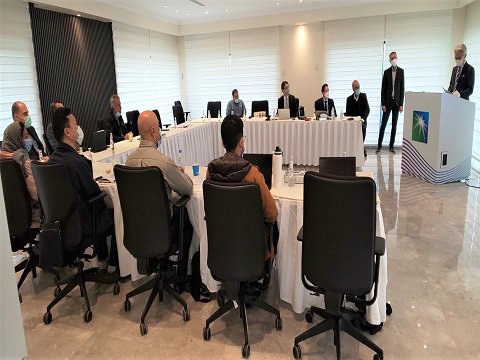 The Al-Khobar office
The Al-Khobar office
Support for local workshop
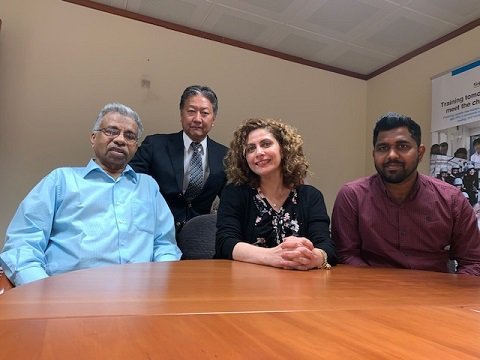 The Middle East office
The Middle East office
